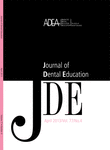- Copyright © 2002 American Dental Education Association
Are traditional cognitive tests useful in predicting clinical success?
Abstract
The purpose of this research was to determine the predictive value of the Dental Admission Test (DAT) for clinical success using Ackerman's theory of ability determinants of skilled performance. The Ackerman theory is a valid, reliable schema in the applied psychology literature used to predict complex skill acquisition. Inconsistent stimulus-response skill acquisition depends primarily on determinants of cognitive ability. Consistent information-processing tasks have been described as "automatic," in which stimuli and responses are mapped in a manner that allows for complete certainty once the relationships have been learned. It is theorized that the skills necessary for success in the clinical component of dental schools involve a significant amount of automatic processing demands and, as such, student performance in the clinics should begin to converge as task practice is realized and tasks become more consistent. Subtest scores of the DAT of four classes were correlated with final grades in nine clinical courses. Results showed that the DAT subtest scores played virtually no role with regard to the final clinical grades. Based on this information, the DAT scores were determined to be of no predictive value in clinical achievement.



